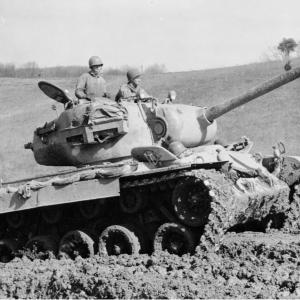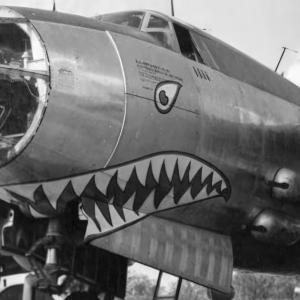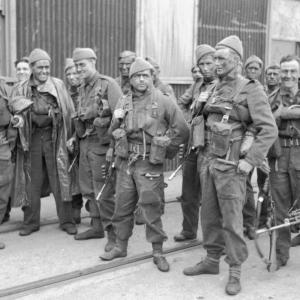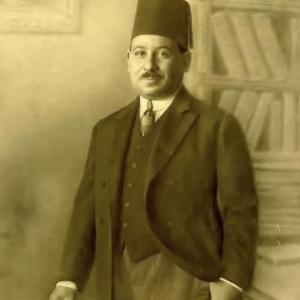
On this day in military history…
On the night of 25 November 1950, one of the most dramatic reversals in modern military history began when an estimated 300,000 Chinese soldiers of the People’s Volunteer Army crossed the Yalu River from Manchuria into North Korea. This massive surprise offensive was known to the Chinese as the Second Phase Offensive, part of a series of operations aimed at driving UN forces out of North Korea. It caught United Nations troops—mostly American—completely off guard and marked the turning point of the Korean War.
The assault was planned by General Peng Dehuai, commander of the Chinese People’s Volunteer Army, under the direct authority of Mao Zedong. Mao personally approved every stage of the operation, which was carefully designed to lure UN forces deeper into the mountains of North Korea before destroying them in sudden, coordinated night attacks. The Chinese government had been alarmed by General Douglas MacArthur’s rapid advance beyond the 38th parallel following the successful Inchon landings in September 1950. By late October, MacArthur’s troops were nearing the Yalu River itself. To Mao and his senior leaders, the presence of American soldiers on China’s border posed an intolerable threat, and they feared it could lead to an invasion of Manchuria. The decision was made to intervene—secretly and decisively.
Before the full-scale assault began, Chinese forces had already carried out a smaller campaign in late October, known as the First Phase Offensive, which inflicted early blows on South Korean units in the north. These attacks were meant to test UN strength and draw them further into a trap. Once the UN forces pushed north again, convinced victory was within reach, the Chinese struck in overwhelming force in their Second Phase Offensive beginning on November 25.
At that moment, the UN command was confident the war was nearly over. General MacArthur even predicted his troops would be “home by Christmas.” The US Eighth Army, led by Lieutenant General Walton Walker, advanced in the west toward the Yalu, while X Corps, under Major General Edward Almond, pushed through the rugged mountains of northeast Korea. The Chinese assault, however, shattered these ambitions overnight. Using bugles, gongs, and whistles to signal attacks, Chinese troops poured through gaps in the UN lines under cover of darkness and freezing winds.
The hardest-hit American units were the 2nd Infantry Division and the 1st Cavalry Division in the west, while in the east, the 1st Marine Division under Major General Oliver P. Smith found itself surrounded near the Chosin Reservoir. In subzero temperatures, the Marines fought their way out in what became one of the most heroic withdrawals in US military history. General Smith famously remarked, “Retreat, hell! We’re just attacking in another direction,” capturing the spirit of his men as they broke through Chinese encirclements.
The results of Operation Second Phase were devastating for the UN command. Within weeks, the Chinese offensive forced the UN armies into a massive retreat southward. Seoul fell again in early January 1951, marking the second time the city changed hands during the war. The once-confident campaign to reunify Korea under the South had collapsed into a desperate fight for survival. In the aftermath, tensions grew between MacArthur and Washington. MacArthur’s insistence on expanding the war into China led to his dismissal by President Truman in April 1951, an event that caused national controversy in the United States.
The Chinese intervention changed the nature of the Korean War entirely. It turned what had seemed a limited, local conflict into a struggle between the world’s great powers—America and China—each unwilling to back down. The war settled into a bloody stalemate around the 38th parallel that would last until the armistice of 1953. The success of the Second Phase Offensive ensured the survival of North Korea and cemented China’s emergence as a major military and political power in Asia.
One fascinating detail about the operation was its reliance on deception and endurance rather than modern technology. The Chinese army had no air force support and very few vehicles, yet they used stealth, terrain, and the cover of night to move entire divisions undetected. Many troops carried little food or ammunition, surviving by seizing UN supplies or enduring extreme hunger. Temperatures plunged below minus 30 degrees Celsius, and thousands froze to death—but their commanders pressed on relentlessly.
The crossing of the Yalu River and the launch of the Second Phase Offensive on that cold November night in 1950 was not only a military operation—it was a turning point in the Cold War. It transformed the Korean conflict from a near victory for the United Nations into a long, grinding stalemate, and it announced to the world that China was prepared to stand up to the United States, no matter the cost.










